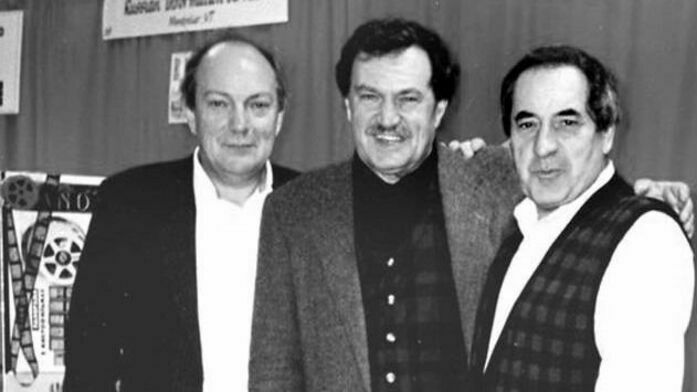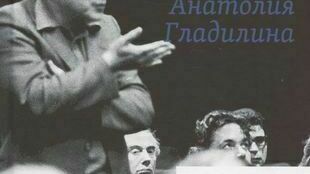Posted 14 марта 2023, 07:40
Published 14 марта 2023, 07:40
Modified 14 марта 2023, 08:41
Updated 14 марта 2023, 08:41

Badly forgotten old. How the Soviet emigration "welcomes" the new Russian emigrants
Sergey Mitroshin
Dmitry Petrov*, recognized as a foreign agent in the Russian Federation, surprised by building a truly grandiose building in the style of a biopic.
Firstly, because few people write big books today, much less read them. Secondly, because it is large not so much in terms of volume (it is also large in terms of volume), but in terms of the presence of significant factual material in it…
So, Dmitry Petrov* is a friend and wrote a book. Below I will explain why to read it and try not to bypass its shortcomings, so that I am not suspected of corruption out of friendship. This is a book about Soviet emigration, which we, contemporaries of today, found mostly in our memories.


At the same time, having also embarked on the path of writing, Petrov* strategically very correctly chose "his theme", describing the path of the writers of the "thaw". There is definitely an audience for whom this topic is both close and interesting, and readers are important to the writer.
Portrait of a Soviet writer against the background of Soviet power
But at the same time it is a very dangerous path, because the witnesses of the era are very jealous of the authors from the outside. "We lived by it, but like who are you here?".
Having finished the work on Vasily Aksenov, published in the series "The Life of Wonderful People", Petrov* presented us with an even more extensive work – "Solo on Fate with an Orchestra", about the creative and life path of Anatoly Gladilin.
Reading it, I wondered in which matrix Petrov * was going to solve his work – in the matrix of Irakli Andronnikov, encyclopediating various little-known anecdotes about writers. Or in the matrix of Arkady Belinkov, who wrote "The Surrender and Death of the Soviet Intellectual", a creative biography of Yuri Olesha, but plunged it into a broad political context and discovered, by the way, that Olesha did not die at all after his wonderful works – "Three Fat Men" and "Envy", and for many years then pulled the strap of a well-fed Soviet life the writer.
Probably, after all, in the Belinkov matrix.
Only in inversion. Since Gladilin did not give up and did not "die" like an intellectual Olesha on state bread, but on the contrary freed himself from state bread (emigrated) and definitely "rose" - from a Soviet serf writer to an "anti-Soviet" and editor of radio stations "Freedom" and "German Wave".


In this regard, the first third of the biopic is extremely interesting and important, showing us the literary life and ideological struggle of the first decade after Stalin's death. There is a lot of material here, compactly collected, which can be used in shaping your attitude to this period.
The second third, it seems to me, is failing somewhat and that's the reason. Immersed in the world of Aksenov-Gladilin, Petrov * involuntarily switches to the refined language of his heroes, while his own language is also quite good.
In my opinion, the time of "literary beauties" and restaurant fantasies of the Aksenov style has already passed somewhat. The modern reader no longer perceives this. "Adventure" "I went to the House of Writers and saw Yevtushenko there" let's leave that party. And in general, it reminds me, roughly speaking, how modern film editing killed the "Tarkovschina". Today, the reader and the viewer need, in the language of the "Oscar", "Everything, Everywhere, All at Once" (English: "Everything everywhere and at once" - the winner of the "Oscar" -2023 for the best feature film, approx.ed) instead of semitones. This is the modern rhythm of life. In the detailed description of the surprised admiration of new emigrants abroad, there was something deeply provincial, if not to say: until recently offensive.
"Why haven't we seen Paris?" Yes, we haven't, but if we want to, we will! In any case, that's what we thought until quite recently.
How democracy has ruined the lives of the fighters for democracy
However, oddly enough, the advantages are a continuation of the disadvantages. The third third of the book returns our interest again and for this reason. The fact is that Petrov*, began writing his book a long time ago, and for some reason undertook to explain to his reader the difficulties of adapting Soviet writers pushed out of the perimeter to the Western way of life, believing it to be some kind of exotic and what can make a contemporary smile. However, a lot of water has flowed since then. Not so much, however, because the "water" was accumulating somewhere in time, but as a result of a certain "all at once" tsunami that occurred, when a huge mass of this water pours out on you at once. In Russian: like from a tub. Since the beginning of the Special Military Operation, many potential readers of Petrov* have become emigrants themselves, and Petrov himself* has been creating in Georgia for six months now, and not in Russia, so the problem of adaptation has turned from an exotic, memorial, into a utilitarian, topical one.


Indeed, Gladilin, Aksenov, Vladimov, Maksimov, Nekrasov and their families had to not only get used to a different lifestyle, but also look for a livelihood, but just as thousands and thousands of new Russian emigrants have to do it today. And it doesn't always work out.
And here is another problem that came to light in the process of reading the Petrovsky biopic.
Who were Soviet writers in Soviet times? In any case, they were in the service of the Soviet state. The state taught them the craft of writing in the relevant institutes, issued a certificate that they had the right to write, and in the future, one way or another, paid for creative business trips, while at the same time demanding that the product meet a certain standard.
Both sides of political relations are generally used to this, fighting mainly for the level of the bar of the possible. When our heroes were forced out of the perimeter by circumstances, the paradigm of writing did not change too much at first. They were claimed by exactly the same state, only the Western one. Work on radio stations and in magazines published in the West, funded by some incomprehensible structures. And it seemed that this was normal, and it would be like this forever.
As always, the Motherland "screwed up" – democratization suddenly began there. Now anyone could write and publish – at their own expense, with a circulation of at least a thousand copies. And no one else asked for a diploma. And in the West, on the contrary, effective managers undertook to optimize financing in connection with the end of the Cold War. It turned out, as expected, that the Russian emigration plunged into intraspecific competition for declining jobs and statuses. Scandals of resentment began.
There was, however, a short period when it seemed that it was possible to "return" and live for a while in the adoration of compatriots. It was possible to publish something. This period, for example, includes Gladilin's novel "The beast Pell killed Me", 1991. Many, in fact, tried to bring their troubles to light, considering them interesting. No one managed to "return", and it was already impossible to raise a second influential Solzhenitsyn. And the first one was steadily losing its charisma.
What's it? It was the beginning of a normal life. Like everyone else. The test of ordinary life. And life for two civilizations, on the contrary, ended. Period?
You will laugh, but we are not putting an end to it. Sometimes, in order to see the past, you need to move away to a sufficient focal length. Today it was formed naturally. Heroics have begun again, publicistic speakers are in demand again, explaining "who we are and where we are going." Greetings from our emigration to yours!
Heroic Petrov* writes "Solo on Destiny with orchestra". Novaya Gazeta, having become a nest of foreign agents, is published in the Czech Republic. "Echo of Moscow" is torn up all over YouTube. Someone has disappeared, and someone has a sense of existence. One hope and one great fear: heroics will end again someday and such a terrible ordinary life will begin again.
*recognized as a foreign agent in the Russian Federation